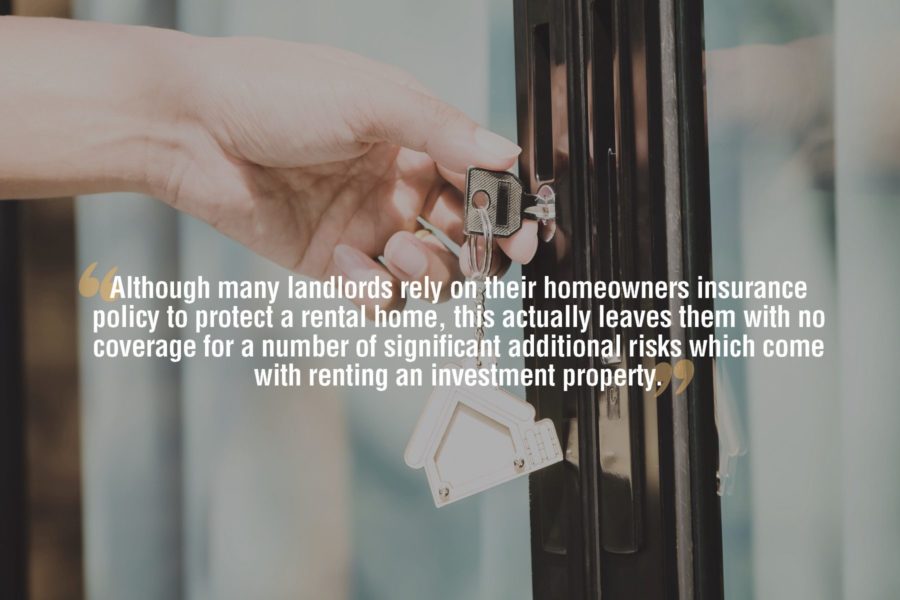In terms of monthly costs, the premiums for landlord insurance are more expensive than homeowners’ insurance. However, nothing would be more expensive than filing a claim for damage to your rental property and finding out that you are not covered under your regular homeowners’ insurance policy.
Although many landlords rely on their homeowners’ insurance policy to protect a rental home, this actually leaves them with no coverage for a number of significant additional risks that come with renting an investment property.
What is the difference between landlord insurance and homeowners’ insurance?
Homeowners’ insurance is designed to cover a residential property based on the typical hazards associated with an owner-occupied property. Landlord insurance includes special coverage for risks that may be unique to ownership of rental properties that are occupied by tenants.
A homeowners’ policy covers a dwelling occupied by a single family with an ownership interest in the upkeep and maintenance of the property, but a rental property is occupied by a tenant who has no such long-term interest.
Moreover, a vacation property may be occupied by different tenants every week, representing a much higher level of risk to an insurance provider.
What does homeowners’ insurance cover?
Homeowners’ insurance provides protection for the dwelling, personal possessions and other structures, such as a studio, garage or fence. Homeowners’ insurance also provides personal liability coverage should someone be injured or suffer damage to their property while on the premises.
What does landlord insurance cover?
Landlord insurance provides similar fire and hazard protection for the dwelling and related structures, and it can also include clauses to cover the landlord’s personal property, liability, loss of income, legal fees and various natural hazards, such as windstorms.
Dwelling Coverage
As with a homeowners’ policy, dwelling coverage protects against loss due to bad weather, such as lightning and hail, or from a fire, explosion or other catastrophic event. Most rental dwelling policies do not cover special risks associated with flooding, earthquakes, hurricanes, power failures or any loss that was caused by the landlord’s own negligence or by intentional actions of the renter.
Coverage for a tenant-occupied dwelling costs more than homeowners’ coverage because insurance companies receive more claims from rental properties than from owner-occupied homes. This may be because tenants have less interest in preventive maintenance and reporting minor problems before they develop the potential for costly damage.
Personal Property Coverage
With landlord insurance, this coverage is for the personal belongings of the landlord. This would include items like curtains, carpets, mirrors and other things of value that are not part of the dwelling. This type of coverage is essential when a rental property is offered as furnished.
Covered personal items also include equipment used to maintain the property, such as a riding mower or hedge trimmer. However, property that is not related to the rental, such as a stored vehicle or computers, would not be covered.
Liability Coverage
Landlord liability protection covers the property owner against financial loss if the tenant or a visitor to the property is injured or suffers damage to their property and the landlord is held legally responsible for the injury or damage. For example, if someone is injured by the failure of a porch railing, the landlord may be required to pay medical bills or legal fees.
Although regular homeowners’ policies include this protection, an insurance provider must account for a statistically higher probability of legal action against a landlord.
Loss of Income
When a rental property is damaged to the extent that a tenant cannot live there and pay rent to the landlord, some policies provide coverage for lost rental income, paying the landlord until the property has been repaired and can be rented again. Rental income could also be lost due to conditions that make the property uninhabitable, such as mold, termites or pests.
In a typical landlord policy, loss of income coverage can be added for about $50 per year, so adding an option that covers income is a good investment for a modest premium.
Legal Fees
Some policies include coverage for the fees and costs associated with hiring legal representation should the landlord need to evict or bring other legal action against a tenant, or should the landlord need defense against a suit brought by a renter or guest.
Special Landlord Coverage
Depending on the location and condition of the rental property, the owner may wish to add coverage for vandalism, which is typically not covered by a standard landlord insurance policy.
Another coverage option for landlord insurance is burglary, as standard policies cover damage from a break-in, but not the value of any stolen items.
Some policies offer insurance for the costs of code compliance should additional repair work be needed in order to bring an older building up to the current building codes.
There are also policies for different types of real estate. Landlords who own a condo that is offered to renters may only need insurance for the inside of the structure.
Umbrella Coverage
If you have a substantial portfolio of properties, you should also consider an umbrella insurance policy, which increases your liability protection. Typically, you can add $1 million of additional liability coverage for about $250 per year.
Different Types of Renters
When you shop for an insurance policy, make sure the insurance company covers the type of rental you will offer. From the perspective of the insurance company, the least risk is with long-term tenants, with slightly more risk associated with short-term tenants, and the highest with vacation or recurring (for example, AirBnb and Vrbo) tenants.
The Bottom Line
Landlord insurance is more expensive than homeowners’ insurance, but the extra protection against the added risks of managing an investment property makes it well worth the modest difference in premiums. Contact us today to speak to a landlord insurance specialist and learn more about how Higginbotham can help protect your investment property.





